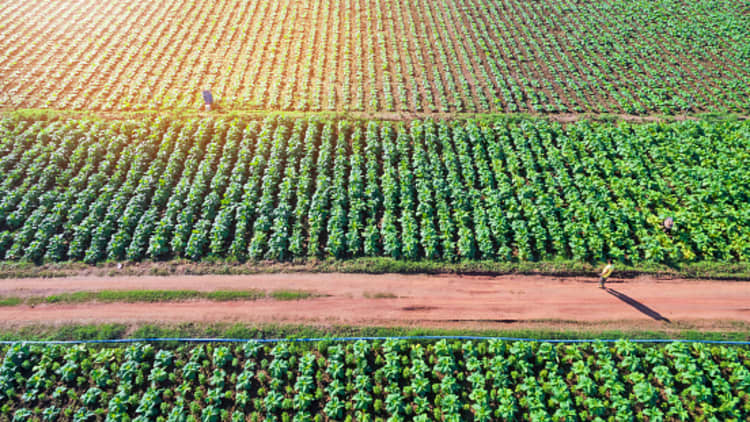American beef, corn and soybeans could benefit the most from the latest trade agreements between the U.S. and China.
Over the weekend, the two countries issued a joint statement stating that both "agreed on meaningful increases in United States agriculture and energy exports," bringing temporary relief to a heated trade dispute. While analysts said the agreement isn't specific enough to have immediate economic impact, some noted key areas in which American farmers would likely benefit.
"We estimate a potential increase of US$60-90bn in Chinese purchases of US goods, with a rise in agriculture imports (particularly beef) in the near term," Morgan Stanley Economist Robin Xing, Strategist Michael Zezas and their team said in a note Sunday.

China reopened its market to U.S. beef in June 2017 for the first time in 14 years after negotiations earlier in the year between the Trump administration and Beijing. Chinese imports of beef globally increased more than nine-fold between 2012 and 2016, to $2.5 billion, according to the U.S. Department of Agriculture.
"Once [our Chinese distributors] get it they can't sell it fast enough. We can't supply them with enough beef right now," said Kent Bacus, director of international trade at the National Cattlemen's Beef Association.
Beef accounts for six specific items on China's list of 106 U.S. goods that Beijing announced additional tariffs on in early April, in retaliation against the Trump administration's proposed tariffs on $50 billion worth of Chinese goods. Other items on the list include soybeans, corn and wheat.
China has "agriculture products on there to get attention and to inflict pain on key constituencies in the U.S.," said Gregory Husisian, chair of the international trade & national security group at Foley & Lardner.
As a result, he expects the items targeted by Beijing will be the Trump administration's focus in negotiating details on trade with Beijing.
Agriculture overall is strategically a key area for Beijing to work with the U.S. China is the second largest destination for U.S. agriculture exports, at $19.6 billion in 2017, according to the U.S. Department of Agriculture Foreign Agricultural Service.
It's an area in which "China can quickly show results," Husisian said. "They could just shift purchases from Europe or other countries fairly easily. From their perspective it represents one that doesn't really require them to do that much."
China has made some concessions on agriculture already. Beijing said Friday it was ending an investigation into imports of U.S. sorghum. The probe had effectively halted trade worth roughly $1.1 billion in 2017.
Further agreements on U.S. agriculture exports will need similar specifics on product type and amount for a deal to be economically effective, analysts said.
Even in the growing beef market, Bacus said Chinese restrictions on imports of the meat injected with hormones or fed "beta-agonists" makes it difficult for U.S. exporters. "We are not anywhere close to reaching our potential in that market," Bacus said.
President Donald Trump does appear focused on improving the trade environment for U.S. agriculture. He focused two of his tweets Monday on the weekend trade deal on the industry: "Under our potential deal with China, they will purchase from our Great American Farmers practically as much as our Farmers can produce," Trump tweeted.
"There's a relief for American farmers here because we were headed towards a situation where the Chinese were going to block imports of U.S. goods," said Derek Scissors, resident scholar at the American Enterprise Institute and chief economist at the China Beige Book. However, the latest developments are just "a restoration of the status quo."
"If you're playing defense, you're trying to protect the soybean trade. If you're playing offense" you will name a particular product, Scissors said. "The test is whether we're going to get specific goods being mentioned."
WATCH: How Chinese businesses can adapt to soybean tariffs



